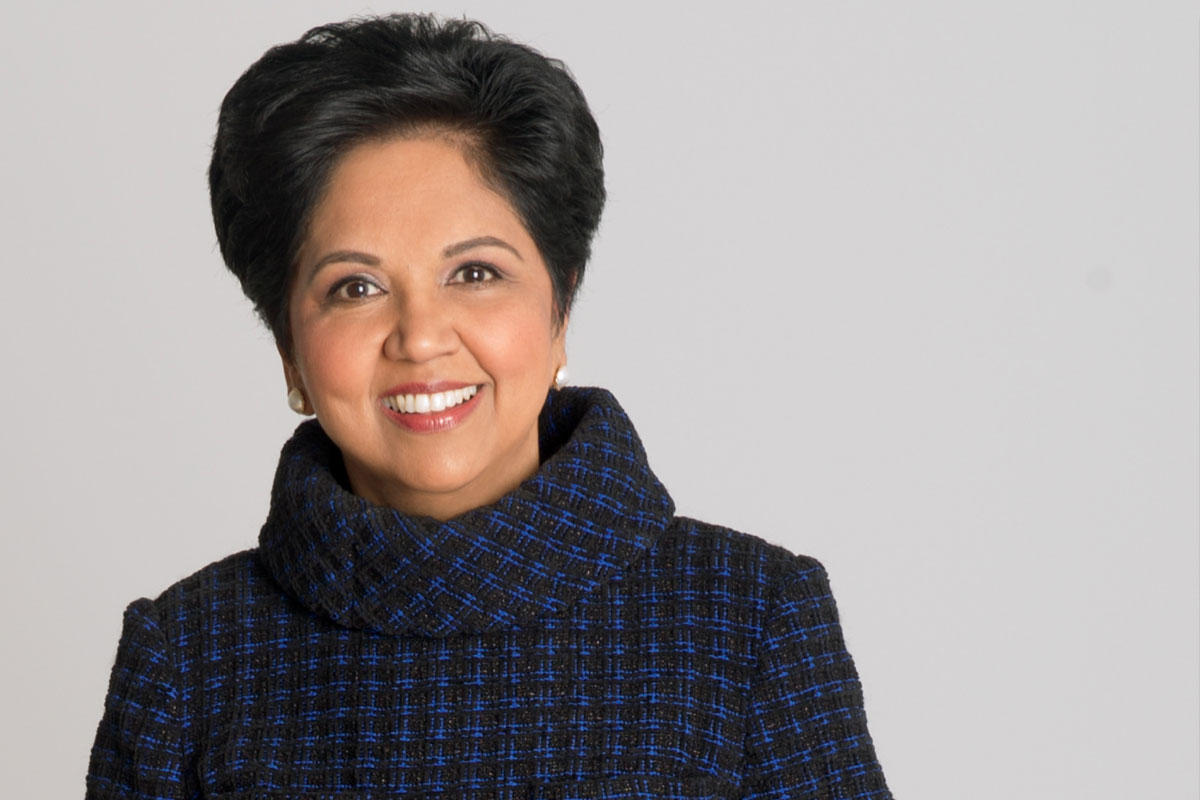Former PepsiCo CEO Indra Nooyi always thought of writing a memoir as a “vanity project.”
However, Nooyi says when she started writing policy papers about supporting women, families and essential workers after her retirement from PepsiCo – she quickly realized her personal story would help get her ideas noticed.
“I start with a fundamental belief that families are critical and core to our life,” Nooyi told Dean Bill Boulding during an interview as part of the Distinguished Speakers Series at Duke University’s Fuqua School of Business.
Nooyi’s memoir My Life in Full explains her belief that family issues are not just women’s issues. “I don’t think that family is female,” Nooyi said. “Family is family, but because the definition of family has been female, females have struggled to maintain a job—paid job—outside the home and manage the family. The amount of juggling they have to do between the two is just too much.”
Nooyi says that juggling is causing some women to put off having a family in favor of a career and others are opting out of work altogether—particularly essential workers who often don’t have flexibility or the resources to afford childcare. Nooyi says ultimately these decisions hurt the economy and believes companies must see child and elder care as business issues.
“If we can get the care equation right, if we can get people paid leave when they need it and flexibility—I think COVID has taught us how flexibility can work—I think we have a fighting chance to tap into the entire workforce, to draw the best and brightest,” Nooyi said.
Nooyi doesn’t believe that it is possible to achieve work-life balance, but instead says families are in a constant juggling act between caregiving and work demands. However, she believes business has a unique opportunity to better support working families, ultimately leading to a more talented workforce.
“Now with all these technologies, I think we can actually think about the future of work differently, by putting families in the middle of it,” Nooyi said. “If I had to do it all over again. I would have come home at 3:30, taken my kids off the bus, sat them down with a snack, started them on homework, and I would have continued working.”
Nooyi says throughout her career she was most focused on her job and her family, driven by an internal work ethic to prove herself in senior leadership roles.
“Every job that I approached, I felt that I was in a hole. Because I felt—people never told me this—but I felt people were thinking, ‘What is this immigrant woman of color doing in the seat of power?’ That’s the way I put myself in a hole,” Nooyi said. “I don’t know why I did that, and then mentally I’d work hard to dig myself out of the hole and outperform.”
Nooyi credits her hard work, preparation, grit, determination, and the support of her family with helping her ascend to the CEO role. She says she wasn’t always included in all of the corporate social events.
“I didn’t care that I didn’t get invited to social events or that the men went fishing or hunting or horseback riding, skeet shooting or golfing. I didn’t care for that. I didn’t do any of those. I don’t drink. I don’t skeet shoot. I don’t eat meat, so none of that stuff mattered to me.”
Nooyi says PepsiCo’s CEO at the time, Roger Enrico, ensured decisions weren’t made in social events without her. “So, when you have that sort of mentorship and support from the CEO, who cares? I had a family I wanted to come back to.”
Nooyi never forgot that type of mentorship and actively sought to pay it forward—with the belief that the best mentors identify their mentees.
“To me, mentors pick you, they see something in you that they like. They think that you are going to go places and with a little push that you can go faster, farther,” Nooyi said. “Mentors pick you, they support you, they promote you, they push you. They critique you and it’s a gift to have someone pick you as a mentee.”
Nooyi says she always looked for character, curiosity and agility in the people she picked to mentor.
“People who were open to ideas. They were open to pushback, criticism, surrounded themselves with great people,” Nooyi said. “I look at all these traits and say these are hallmarks of a good leader, with a little bit of polish, (they) could be a great leader.”
Nooyi views mentorship and sponsorship as the same role – meaning mentors should not only coach development but actively work to make sure a mentee is noticed and promoted.
“It’s mentors with a big capital ‘M’—people who pick you and people who just push you to do the impossible and then give you tailwinds.”
Editor’s note: Read more about Indra’s thoughts on the business role in improving society here.
